
Indian Journal of Traditional Knowledge
Scope & Guideline
Bridging Tradition and Innovation in Health
Introduction
Aims and Scopes
- Traditional Medicine and Ethnobotany:
The journal covers research on traditional medicinal practices, the use of medicinal plants, and ethnobotanical studies that document indigenous knowledge regarding health and healing. - Sustainable Agriculture and Food Security:
Research focusing on traditional agricultural practices, crop varieties, and food systems, emphasizing sustainable farming methods and the preservation of biodiversity. - Cultural Heritage and Indigenous Knowledge:
The journal explores various aspects of cultural heritage, including traditional crafts, food, and local customs, highlighting how these practices contribute to community identity and resilience. - Phytochemistry and Pharmacognosy:
Studies that investigate the chemical properties of plants used in traditional medicine, including their bioactive compounds, safety, and efficacy. - Climate Change Adaptation and Environmental Management:
Research related to traditional ecological knowledge and practices that contribute to climate resilience and environmental sustainability.
Trending and Emerging
- Integration of Traditional and Modern Medicine:
There is a growing trend in research focusing on the integration of traditional healing practices with modern medical approaches, particularly in the context of managing chronic diseases and public health crises like COVID-19. - Impact of Climate Change on Traditional Practices:
Research addressing how climate change affects traditional agricultural practices and biodiversity is gaining traction, reflecting a broader concern for environmental sustainability. - Nutritional and Health Benefits of Traditional Foods:
An increasing number of studies are highlighting the nutritional profiles and health benefits of traditional foods, particularly those that are underutilized yet rich in nutrients. - Ethnopharmacology and Bioprospecting:
There is an emerging focus on ethnopharmacological studies that explore the potential of traditional medicinal plants for drug development, especially in the context of antimicrobial resistance. - Community-Based Conservation Efforts:
Research on community-led conservation initiatives that utilize traditional ecological knowledge is on the rise, emphasizing the importance of local practices in biodiversity preservation.
Declining or Waning
- Traditional Craftsmanship:
Research on traditional crafts and artisanal practices has decreased, possibly overshadowed by more pressing health and agricultural themes in contemporary research. - Folk Remedies and Local Healing Practices:
There has been a noticeable reduction in studies focusing solely on folk remedies, as more emphasis is placed on scientifically validating traditional medicines rather than documenting anecdotal practices. - Indigenous Animal Husbandry Techniques:
Papers on traditional livestock management and veterinary practices have become less frequent, likely due to the rising integration of modern veterinary practices and technologies. - Historical Studies on Traditional Knowledge:
Fewer papers seem to explore the historical evolution of traditional knowledge systems, as current research trends lean towards practical applications and contemporary relevance.
Similar Journals
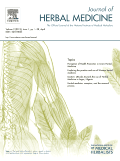
Journal of Herbal Medicine
Innovating the Future of Healthcare with Herbal InsightsThe Journal of Herbal Medicine, published by Elsevier GmbH in Germany, stands at the forefront of research in the dynamic and evolving field of complementary and alternative medicine. With an ISSN of 2210-8033 and an E-ISSN of 2210-8041, this journal has been contributing significant insights since its inception in 2011 and continues to be a vital resource through 2024. Recognized for its scholarly rigor, it holds a commendable Q2 ranking in the 2023 Scopus category for Complementary and Alternative Medicine, placing it in the upper echelons of its field with a rank of 32 out of 105 journals, marking it in the 70th percentile. The Journal of Herbal Medicine emphasizes the integration of traditional herbal therapies and modern scientific approaches, offering researchers, professionals, and students a platform for disseminating their findings and fostering an inclusive dialogue on natural medicine's role in healthcare. Although it is not an open-access publication, its commitment to high-quality research makes it an essential read for those wanting to explore the efficacy and application of herbal medicine in contemporary practice.
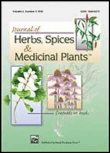
JOURNAL OF HERBS SPICES AND MEDICINAL PLANTS
Discovering the Science Behind Nature's PharmacyJOURNAL OF HERBS SPICES AND MEDICINAL PLANTS, published by Taylor & Francis Ltd, serves as a pivotal platform for researchers and professionals in the fields of Complementary and Alternative Medicine and Pharmacology. With an ISSN of 1049-6475 and E-ISSN of 1540-3580, this journal is dedicated to advancing the understanding of the therapeutic potential of herbs, spices, and various medicinal plants, and showcases high-quality, peer-reviewed research from 1992 to 2024. As of 2023, it holds a respectable Q3 ranking in both relevant categories, exhibiting its growing influence within the academic community. The journal is not open access, yet it remains a vital resource for those exploring the diverse applications and efficacy of plant-based therapies. Researchers and students alike will benefit from the journal’s commitment to disseminating innovative findings that can enhance the quality of life through natural remedies, thereby contributing significantly to the global discourse on herbal medicine.

Traditional & Kampo Medicine
Advancing Knowledge in Complementary MedicineTraditional & Kampo Medicine is a distinguished journal published by Wiley, focusing on the rich traditions and scientific advancements in complementary and alternative medicine, particularly within the realms of Traditional Chinese medicine and Kampo. With an E-ISSN of 2053-4515, this journal serves as a pivotal platform for researchers, professionals, and students interested in exploring the integration and evidence-based application of traditional healing practices in contemporary medical contexts. Since its inception in 2014 and projected until 2024, it has carved out a notable place in academic contributions, being ranked in the 3rd quartile for Complementary and Alternative Medicine and the 4th quartile for Pharmacology (Medical) as of 2023. While the access options are not explicitly stated, the journal fosters scholarly debate and disseminates innovative findings that underscore the importance of traditional healing methodologies within modern healthcare paradigms. By bridging ancient wisdom and scientific inquiry, Traditional & Kampo Medicine plays a crucial role in advancing the understanding and application of holistic health approaches.

Journal of Ethnobiology and Ethnomedicine
Celebrating the Rich Tapestry of Ethnomedicine and EthnobiologyJournal of Ethnobiology and Ethnomedicine, published by BMC in the United Kingdom, is a premier open-access journal that has been at the forefront of interdisciplinary scholarship since its inception in 2005. With its focus on the intricate relationships between humans and their biological environments, the journal serves as a vital resource for researchers, professionals, and students alike. It boasts a remarkable impact, reflected in its status as a Q1 journal in prominent categories such as Agricultural and Biological Sciences, Complementary and Alternative Medicine, and Cultural Studies. The journal is indexed in Scopus, where it ranks impressively high, including a top 1% position in Cultural Studies and a notable 90th percentile ranking in Complementary and Alternative Medicine. By providing open access to insightful articles that bridge empirical research and cultural knowledge, the Journal of Ethnobiology and Ethnomedicine plays a crucial role in advancing the discourse surrounding traditional practices and their implications for health and sustainability. Join us in exploring this fascinating domain where science meets cultural wisdom.
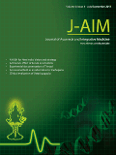
Journal of Ayurveda and Integrative Medicine
Fostering collaboration in the realm of integrative medicine.Welcome to the Journal of Ayurveda and Integrative Medicine, a pioneering academic platform published by Elsevier that has been committed to advancing the field of integrative health sciences since its inception in 2010. With a strong focus on complementary and alternative medicine, the journal is essential for researchers, professionals, and students aiming to explore the intersections of traditional Ayurvedic practices and modern medicine. As an Open Access publication since 2016, it ensures that groundbreaking research is widely disseminated and accessible to a global audience. The journal holds notable rankings, being placed in the Q2 category for complementary and alternative medicine and Q3 for drug discovery, accompanying it with impressive Scopus rankings that underline its influence in the medical community. With its comprehensive scope and commitment to quality, the Journal of Ayurveda and Integrative Medicine is crucial for fostering innovation and collaboration within the therapeutic landscape.
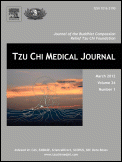
Tzu Chi Medical Journal
Empowering medical innovation for a global audience.Tzu Chi Medical Journal, published by Wolters Kluwer Medknow Publications, is a prominent open-access journal that has been serving the medical community since its inception in 1997. With an ISSN of 1016-3190 and an E-ISSN of 2223-8956, this journal is dedicated to disseminating valuable research across various domains of medicine, achieving a prestigious Q3 ranking in the Medicine (miscellaneous) category for 2023. Operating under an open-access model since 2017, it ensures that research is freely accessible to a global audience, fostering collaboration and innovation in healthcare. Tzu Chi Medical Journal is recognized for its quality contributions, ranked #152 out of 636 in the general medicine category on Scopus, placing it in the top 25% of journals in this field. Based in Mumbai, India, it serves as an essential platform for researchers, healthcare professionals, and students aiming to share and engage with groundbreaking work in medicine, thus driving the field forward.

Natural Product Communications
Exploring the Therapeutic Treasures of NatureNatural Product Communications is an esteemed open-access journal published by SAGE Publications Inc, dedicated to the exploration and dissemination of knowledge concerning natural products in diverse fields, including Complementary and Alternative Medicine, Drug Discovery, and Pharmacology. Since its inception in 2006 and continuing through its converged years until 2024, the journal has gained recognition with a robust focus on plant science and the medicinal properties of natural products. With a commendable impact factor reflected in its category quartiles (Q3 across key domains), Natural Product Communications serves as a vital resource for researchers and professionals who aim to further the understanding of the therapeutic potential of natural compounds. As an open-access journal since 2020, it ensures wide accessibility to its published research, thereby facilitating collaboration and innovation within the scientific community. This commitment to excellence makes Natural Product Communications a crucial platform for advancing research in the holistic and pharmacological sciences.

Indian Journal of Natural Products and Resources
Empowering Research in Natural Products and ResourcesIndian Journal of Natural Products and Resources, published by NATL INST SCIENCE COMMUNICATION & INFORMATION RESOURCES-NISCAIR, serves as a vibrant platform for researchers and professionals engaged in the fields of agronomy, crop science, food science, and plant science. Established in 2006 and embracing an open-access model since 2009, this journal is dedicated to disseminating innovative research and fostering collaboration among scholars in India and beyond. With a focus on the sustainable use and management of natural products and resources, it aims to explore topics that address contemporary challenges in agriculture and food security. As of 2023, the journal holds a Q4 ranking in its respective categories and is indexed in Scopus, albeit with an emphasis on enhancing its visibility and citation impact. By providing an accessible venue for high-quality research, the Indian Journal of Natural Products and Resources plays a crucial role in contributing to the scientific discourse and promoting advancements in sustainable practices in the natural resources sector.
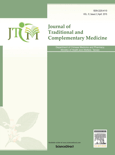
Journal of Traditional and Complementary Medicine
Connecting Cultures Through Complementary MedicineJournal of Traditional and Complementary Medicine is a distinguished journal in the field of Complementary and Alternative Medicine, published by Elsevier. With an impressive impact factor, the journal is ranked Q1 in its category and boasts a Scopus ranking of #5 out of 105, placing it in the top 5% of relevant journals globally. Since its inception in 2011, the journal has transitioned to an Open Access model in 2015, ensuring that research is accessible to a wider audience. The journal serves as a critical platform for researchers, healthcare professionals, and students to explore and disseminate information about traditional and complementary treatment modalities, bridging the gap between ancient practices and modern medicine. With its commitment to rigorous peer review and an expansive scope encompassing a range of topics related to traditional medicine, the Journal of Traditional and Complementary Medicine continues to play a pivotal role in advancing understanding and application of alternative therapies in healthcare.

ALTERNATIVE THERAPIES IN HEALTH AND MEDICINE
Exploring Holistic Healing PathsAlternative Therapies in Health and Medicine is a distinguished peer-reviewed journal, published by InnoVision Professional Media, dedicated to advancing the field of complementary and alternative medicine. Since its inception in 1995, this journal has provided a platform for the dissemination of research focusing on holistic approaches to healthcare, innovative therapies, and integrative practices. With an ISSN of 1078-6791 and an E-ISSN of 1078-6791, it offers valuable insights crucial for researchers, healthcare professionals, and students alike. While the journal currently holds a Q3 ranking in both Complementary and Alternative Medicine and Miscellaneous Medicine categories as of 2023, it aims to foster an inclusive dialogue surrounding non-conventional medical practices and their integration into mainstream health paradigms. As the journal continues its journey through 2024, it remains steadfast in its objective to enrich academic discourse and promote evidence-based alternative therapies. Access to the journal is available through institutional subscriptions, enhancing its reach within the global academic community.